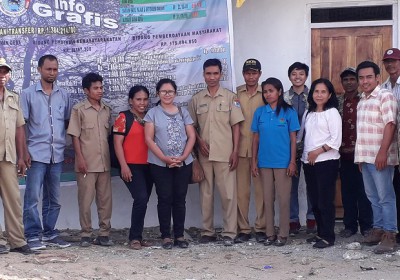Selected Speaker for IDF 2019: Agus Pratiwi Promotes Inclusive Village Development Policy for Women
November 11, 2019
Agus Pratiwi with people from Mandahu Village.
Cash Labor Intensive in Village (PKTD) serves as an important beginning to improve gender equality in rural areas in the construction sector and other male expertise-related sectors. According to a Selected Speaker for IDF 2019 Agus Pratiwi, in addition to reflecting professionalism in village development work, PKTD must also be gender friendly. Pratiwi writes this in a presentation entitled “Enabling Inclusive Opportunity for Women in Village Development through Cash Labor Intensive in Village (PKTD) Program.”
“The recommendation is, of course, designing a village development policy package as a gender concerned policy,” said Pratiwi.
Agus Pratiwi is the Program Manager and Social Policy Research at Article 33 Indonesia, a research institution for social change in the form of an association. Agus’ researches revolve around issues of gender, workforce, and rural development. Graduated from the University of Padjajaran, Pratiwi is also teaching in her former university, in the Faculty of Law to be exact. Before working in Article 33, Agus Pratiwi was active in LBH Jakarta and Rechtswinkel Tilburg.
With regards to PKTD in Pratiwi’s research, this program is intended to achieve the target of creating 5 to 6.6 million workers in rural areas. In Article 33’s webpage, Pratiwi wrote that besides promoting community participation in village development, allocating 30 percent of village funds for labor-intensive program serves to create temporary jobs and increase people’s purchasing power in rural areas. Also, PKTD is expected to improve women’s access to participating and empowering villagers.
Pratiwi identifies gender relations in households, village community level, and broader public domain as factors affecting women’s engagement in village development. Her studies were conducted in Karangmulya Village and Karangkerta Village in Indramayu District, West Java Province, as well as in Mandahu Village and Makamenggit Village in East Sumba District, East Nusa Tenggara Province.
Women’s Challenges in Utilising PKTD
Pratiwi said that in general, the perception of men and women still considers that the role of women in village infrastructure development (including via PKTD) clashes with women’s traditional role, especially related to household roles, such as childcare and so on.
“Even if they are involved, generally, women are still participating in secondary jobs, such as providing coffee and lunch for male PKTD workers. As a result, due to merely being considered as ‘helping around’, women do not receive Man-Day (HOK) wages,” stated Pratiwi again.
Two primary challenges are making it difficult for women to be engaged. First, a challenge arises when women’s expectation of PKTD benefits is only limited to household uses, for example, to enable easier access to water. Women have not had a broader expectation on how to use PKTD, such as using the result of development via PKTD to access sustainable work or seek justice when suffering from Domestic Violence (KDRT).
“The point is, women have yet to imagine that the developmental results through PKTD can be used beyond household affairs,” added Pratiwi.
The second challenge, generally village development, specifically PKTD, has not been designed in a gender-equal program and policy, both in planning and implementation.
“For instance, The Minister of Village Regulation on the Priority of Village Fund Use still associates gender mainstreaming as ‘women’s needs,’ not ‘men and women’s needs,” said Pratiwi.
Creating Gender Concerned Village Development Policy
According to Pratiwi, going forward PKTD and other village development programs need to be designed in a gender concerned way so that they can engage and be used more by women. A gender concerned policy is required, first, because the main issue lies at the household level, both from the perception and gender relations aspect in conducting household work. Therefore, Pratiwi thinks that the Village Minister Regulation Number 3 Year 2015 on Village Mentoring should be made by giving space for intervention at the household level.
“Or at least allow Village Mentors to collaborate with program mentors related to changing the perception at the household level, such as the mentor for Family Planning at the village level,” she added.
Second, to ensure that there is no obstacle at the household level, the General Guideline of PKTD Implementation can provide the need for gender equality infrastructures, such as daycare and lactation rooms situated around the PKTD project.
Another recommendation from Pratiwi is that PKTD can be integrated with technology-intensive infrastructures development programs such as Eastern Indonesia National Roads Improvement Project (EINRIP) and Provincial Road Improvement and Maintenance (PRIM). Besides integrating village roads and provincial roads as well as knowing about road construction technology, the people involved in PKTD work can make programs like EINRIP and PRIM as their targeted, sustainable jobs.
PKTD should also be used to enhance skills, both men and women, through an infrastructure technique mentoring system created by the Ministry of Village. They can use their experience working in the PKTD as a portfolio.
During IDF 2019, Pratiwi conveyed her presentation in the Creating Inclusive Employment Opportunities session on July 23, 2019. Pratiwi’s research is in line with policies to reduce challenges for vulnerable groups to obtain good jobs. This discussion is included in Subtheme-3 Creating Inclusive Employment Opportunities, which is a part of IDF 2019’s main theme, “Mission Possible: Seizing the Opportunities for Future Work to Drive Inclusive Growth."
Indonesia’s Research Institutions Supporting the Development of the Electric Vehicle Industry
Indonesian Muslim Fashion and Cosmetics IKMs Shine at Dubai World Expo 2020
Govt Steps Up UMKM Transformation Efforts in the Midst of Pandemic Slowdown
Govt Encourages Promotion of IKM Products in Digital Era
Government Begins Developing Maritime Training Center in Makassar
Tweets by IDDevForum
